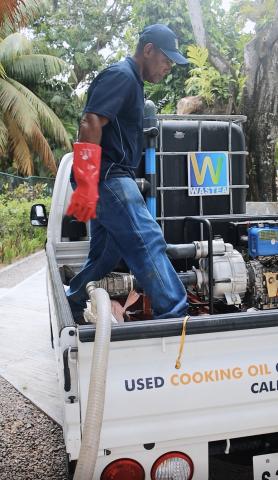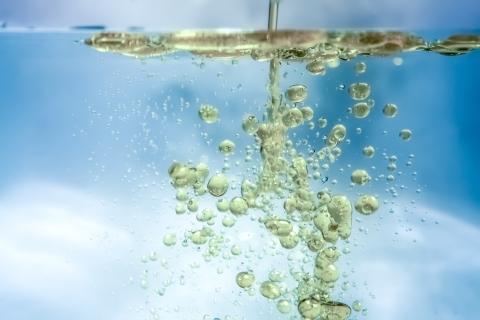
Recycling Cooking oil as a sustainability best practice
From the time when we introduced the Sports Bar and Grill Concept, first in Bel Ombre and then a year later in Victoria, we have been very conscious of finding sustainable and responsible ways to operate.
“We get huge orders on a daily basis, especially for our Cajun Chicken wings. On a monthly basis we use anywhere between 600-700 l of oil. After using cooking oil, it needs to be safely stored and disposed of to protect the natural environment and keep your commercial kitchen safe. We store our used cooking oil in a reservoir as mandated by fire safety protocols, and once a month Wastea come to collect it. – Explains our Head Chef, Chef Arnold Ernesta
Why must cooking oil be stored and disposed of properly ?
Sewers are full of chemicals and when cooking oil comes into contact with these chemicals, they react together and form a new soapy, waxy substance known as a fatberg. As they form, they stick to the walls of sewers and collect bits of other debris, they keep growing and growing over time, and can cause extremely costly and time consuming damage to the central sewer system.
Improper disposal of cooking oil down the drain can, not only cause damage within the sewer system, but also contaminate the natural environment; waste oil has continuously ranked among the top pollutants in the world, especially in bodies of water (www.nrdc.org).


Waste oil pollution has an extremely harmful effect on aquatic ecosystems because it forms a thin coating on the surface that prevents oxygen from reaching the plants and animals that dwell in the water. Waste oil in the ground and soil can coat or kill creatures that are needed to keep the environment in balance. Waste oil can seep into groundwater systems if it is poured down the drain or spilt on the ground. In fact, a million litres of water is easily contaminated just by one litre of waste oil.
So How should Used Cooking Oil be disposed of ?
When it comes to used cooking oil disposal, the most environmentally friendly option is to ensure that the used oil is recycled. To do this, we decided to work with a professional company that collects used cooking oil and takes it where it can be recycled.
“We started the collection of used cooking oil because we wanted to ensure that the oil is disposed of in a proper manner and doesn’t damage the environment” says Dion Elizabeth, Sales and Marketing executive at Wastea. “The process we use is quite simple, we offer commercial kitchens a reservoir where they can safely collect cooled down used cooking oil. When the tank is almost full we come and collect the oil. From there we filter it, and once we have a clean product we export it to our partner overseas and they process it and recycle it into biodiesel.”

Currently in Seychelles, there is no infrastructure, namely a refinery, which can recycle used cooking oil. Wastea partners with an international company that is EU certified, under the European Union Environmental and Sustainability act.
Presently this service is available for businesses, but Wastea says they are working on a project that will allow them to offer this service to individuals and households as well.
We hope you enjoyed this feature and got some good take-aways from our blog. Stay tuned for the next edition to find out more about our Sustainability Best Practices.
